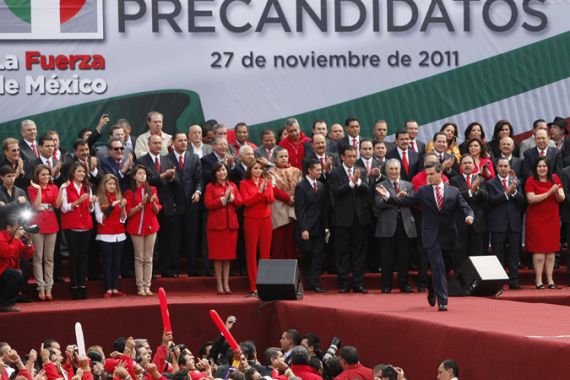
The importance of Mexico’s elections
How will Mexico’s drug war and growing poverty impact the upcoming 2012 elections?
On July 1, 2012 Mexicans will go to the polls to choose a new president, new senators and federal deputies – and if opinion polls are to be believed, possibly a new governing party.
A major election issue is the country’s crackdown against organised crime which is now in its sixth year. It has caused violence to flare in states that are on the drug route to the US and more than 50,000 people have been killed since 2006.
With an increasing inequality between rich and poor, the economy is another big election issue.
|
“The level of frustration that exists in Mexico, very much aggravated by the violence, is not going to be satisfied by offering a labour reform. It has to be satisfied by offering a new future.“ – Manuel Camacho Solis, Mexico’s former secretary of foreign affairs |
Due to political paralysis, President Felipe Calderon has been unable to push through some reforms which many consider necessary, such as liberalising the labour market.
There are three main parties which have candidates running in the election.
First of all there is the Institutional Revolutionary Party (PRI), which ruled Mexico as a one-party-state for most of the last century but lost power in 2000.
Its candidate for 2012 is Enrique Pena Nieto, who is a former governor of Mexico State.
The Democratic Revolutionary Party (PRD), is an off-shoot of the PRI party. Its candidate is Andres Manuel Lopez Obrador, a former mayor of Mexico City, who lost in the 2006 election but contested the results and led weeks of protests in the capital.
The ruling National Action Party (PAN) is the party of Felipe Calderon, the current president. It is not yet known who its candidate will be in 2012.
Given the issues of drug violence and growing poverty, why is Mexico’s election important to the region?
Inside Story Americas discusses with guests: Manuel Camacho Solis, Mexico’s former secretary of foreign affairs and also the former mayor of Mexico City, and a supporter of the PRD party; Christopher Wilson, who works on Mexico’s economy and US-Mexico border affairs at the Woodrow Wilson Center in Washington DC; and Daniel Brito of the Drug Policy Alliance, a group that promotes alternatives to current drug policy, and he has also studied Mexico’s
drug war.
|
“Drug cartels though are essentially money-making organisations, and to the degree that they engage with politics it’s only to the degree that they need to in order to continue making profits.” Daniel Brito, Drug Policy Alliance |